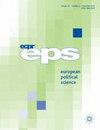Aiding Ukraine in the Russian war: unity or new dividing line among Europeans?
IF 1.9
2区 社会学
Q2 POLITICAL SCIENCE
引用次数: 0
Abstract
Abstract The Russian invasion of Ukraine has caused a seemingly high level of unity amongst Europeans in support of Ukraine. However, this article uncovers some inter- and intra-country fault-lines in public opinion across and within 16 EU countries and the UK regarding pro-Ukraine aid initiatives by using a two-wave design with data from the EUI-YouGov survey conducted in April and September 2022. Findings show that support is relatively stable but varies a lot depending on the specific measure and between countries. We uncover lowest support for measures that go against the self-interest of Europeans such as deploying troops and accepting higher energy costs. Frontrunners of Ukraine support are geographically close to Russia and located in both Western and Eastern Europe (though not exclusively), whereas laggards are countries of Eastern and Southern Europe with a history of Russian ties during the Cold War. Yet within countries, Ukraine support does not follow a simple pre-determined ideological pattern of the left and right. Most countries with lower overall support for Ukraine display a higher level of polarization between supporters of the incumbent versus the opposition party. Understanding these fault-lines is important for insights on current and future levels of Ukraine aid across Europe.在对俄战争中援助乌克兰:欧洲的团结还是新的分界线?
摘要俄罗斯入侵乌克兰导致欧洲人似乎高度团结起来支持乌克兰。然而,本文通过使用来自EU - yougov于2022年4月和9月进行的调查数据的两波设计,揭示了16个欧盟国家和英国之间以及内部关于亲乌克兰援助倡议的公众舆论中的一些国家间和国内断层线。调查结果显示,支持率相对稳定,但根据具体衡量标准和国家之间的差异很大。我们发现,对于那些违背欧洲自身利益的措施,如部署军队和接受更高的能源成本,支持率最低。支持乌克兰的领跑者在地理上靠近俄罗斯,位于西欧和东欧(尽管并非全部),而落后的是东欧和南欧国家,它们在冷战期间与俄罗斯有过联系。然而,在各国内部,对乌克兰的支持并不遵循简单的左翼和右翼的预先确定的意识形态模式。对乌克兰总体支持率较低的大多数国家,现任总统的支持者与反对党的支持者之间的两极分化程度较高。了解这些断层线对于了解欧洲目前和未来对乌克兰的援助水平非常重要。
本文章由计算机程序翻译,如有差异,请以英文原文为准。
求助全文
约1分钟内获得全文
求助全文
来源期刊

European Political Science
POLITICAL SCIENCE-
CiteScore
3.80
自引率
20.00%
发文量
46
期刊介绍:
European Political Science (EPS) is an international journal devoted to publishing contributions by and for the political science community. Its interpretation of ''political science'' is wide and encompasses comparative politics, political economy, international relations, public administration, political theory, European studies and related disciplines. Although our traditional focus has been on European affairs and the development of the discipline, we are always on the lookout for work that compares politics in Europe with other continents and countries, and more general work (on other regions) that would be of interest to European political scientists (our main readership). As the professional journal of the European Consortium for Political Research, EPS is also a prime outlet for research notes and opinion pieces about the political science profession, including teaching and learning contributions, as well as symposia and academic debates. As a new initiative, we also publish original datasets.
The editors of European Political Science (EPS), invite you to submit the following types of articles.
Research - articles on conceptual, methodological, and theoretical developments and trends in political science. Articles aimed at this section should be intellectually stimulating, conceptually rigorous, critical and above all agenda-setting.
Profession - articles about the state of the discipline, and where it is heading, relations between academia and politicians, policy-makers, journalists and ordinary citizens.
Teaching - articles, debates and symposia on new approaches to teaching and learning political science.
Debate - a collection of 3 to 4 articles (maximum 20,000 words) that exposes two countervailing perspectives on important current affairs or professional matters in order to generate awareness and reactions from the political science community.
Symposium - a collection of 4 to 5 articles (maximum length 25,000 words) on a specific topic and under the coordination of one or two guest editors. The articles must cover either research matters (including the discipline, methodological and conceptual developments, as well as research findings in the classical sense that may contribute to an advancement of the discipline). Symposia can also tackle professional matters (such as career structures and prospects, external evaluation, higher education reforms, accreditation issues, funding trends).
Datasets - original dataset accompanied by a short explanatory note explaining the dataset, its novelty, the variables included and the data sources. The descriptive piece will be under copyright, but not the dataset. This format allows authors to get their dataset published and cited, but also allows them and others them and others to use the data for research articles.
 求助内容:
求助内容: 应助结果提醒方式:
应助结果提醒方式:


